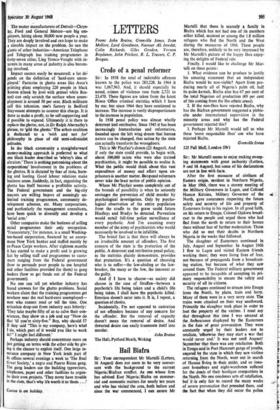Credo of a penal reformer
LETTERS
From: John Braine, Grenville Jones, Joan Mellors, Lord Goodman, Nameer Ali Jawdat, Colin Rickards, Giles Gordon, Vernon Bogdanor, John Prickett, R. L. Travers, C. P. Brogan.
Sir: In 1938 the total of indictable offences known to the police was 283,220. In 1964 it was 1,067,963. And, it should especially be noted, -crimes of violence -rose from 2,721 to 23,470. These figures are taken from the latest Home Office criminal statistics which I have by me; but since 1964 they have continued to increase. The increase is vastly disproportionate to the increase in population.
In 1938 penal policy was almost wholly deterrent lind retributive. Since 1945 it has been increasingly humanitarian and reformative, founded upon the left wing dream that human nature can be changed, that action by the state can actually transform the wrongdoers.
This is Mr Playfair's dream (23 August). And if only the state could provide, to begin with, about 100,000 saints who were also trained psychiatrists, it might be possible to realise it. What the public would think about this vast expenditure of money and effort upon ex- prisoners is another matter. Butannai reformers never take the least notice of public opinion.
Where Mr Playfair seems completely out of the bounds of possibility is when he seriously envisages the prevention ,of child murder by psychological investigation. Only by psycho- logical observation of the entire population from the cradle to the grave could future Hindleys and Bradys be detected. Prevention would entail full-time police surveillance of every psychotic. And I'm assuming every member of the army of psychiatrists who would necessarily be involved to be infallible.
The brutal fact is that there will always be an irreducible amount of offenders. The first concern of the state is the protection of the public. A deterrent and retributive penal policy, as the statistics plainly demonstrate, provides that protection. It's a question of choosing who is to suffer—the law-abiding or .the law- breaker, the many or the few, the innocent or the guilty.
And if I have to choose—as society did choose in the case of Straffen—between a psychotic's life being taken and a child's life being taken, I shall have the psychotic killed. Emotion doesn't enter into it. It is, I repeat, a question of choice.
Incidentally, I'm not opposed to castration of sex offenders because of any concern for the offender. But the removal of capacity doesn't mean the removal of desire. And thwarted desire can easily transmute itself into murder.


































 Previous page
Previous page